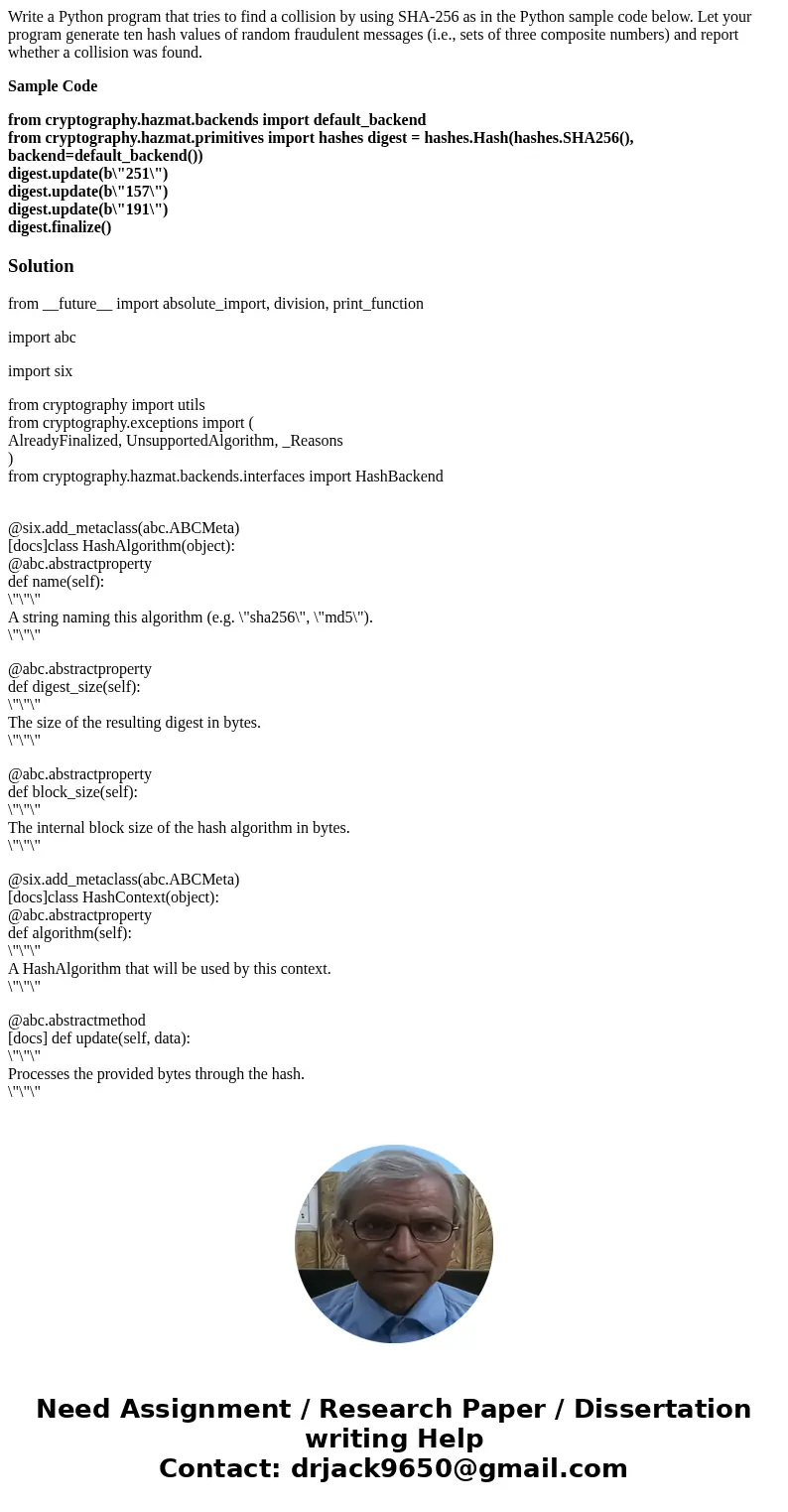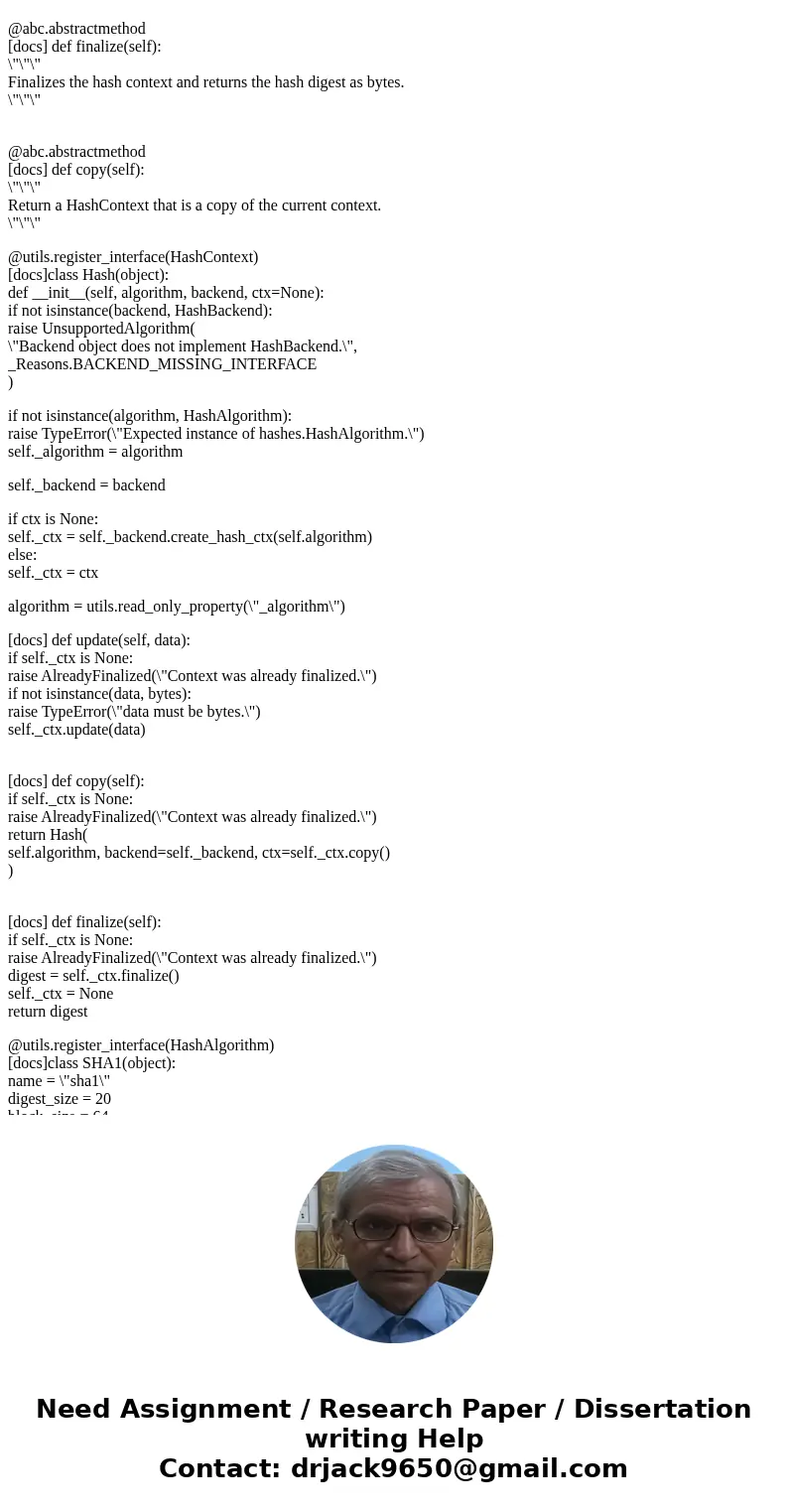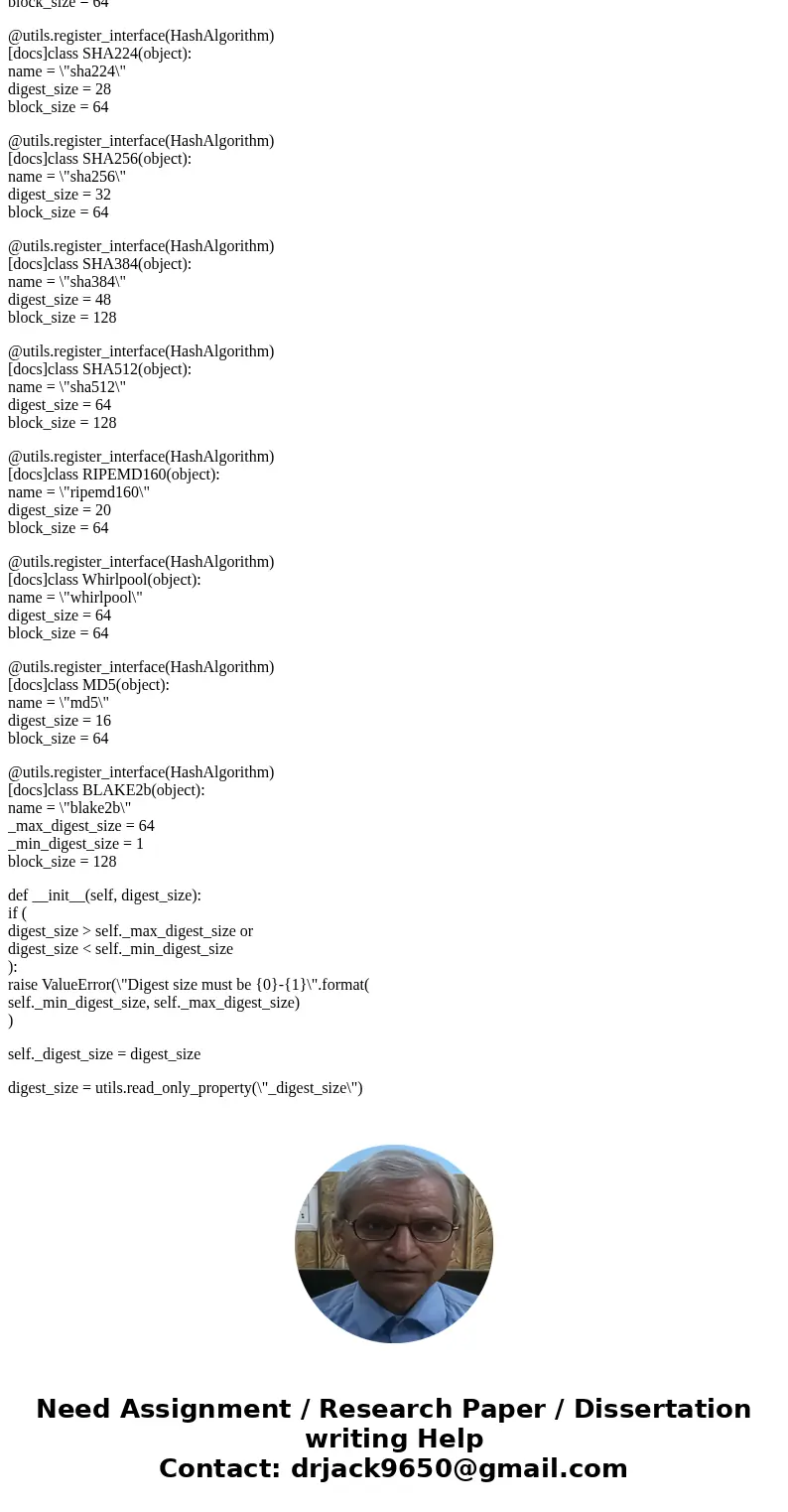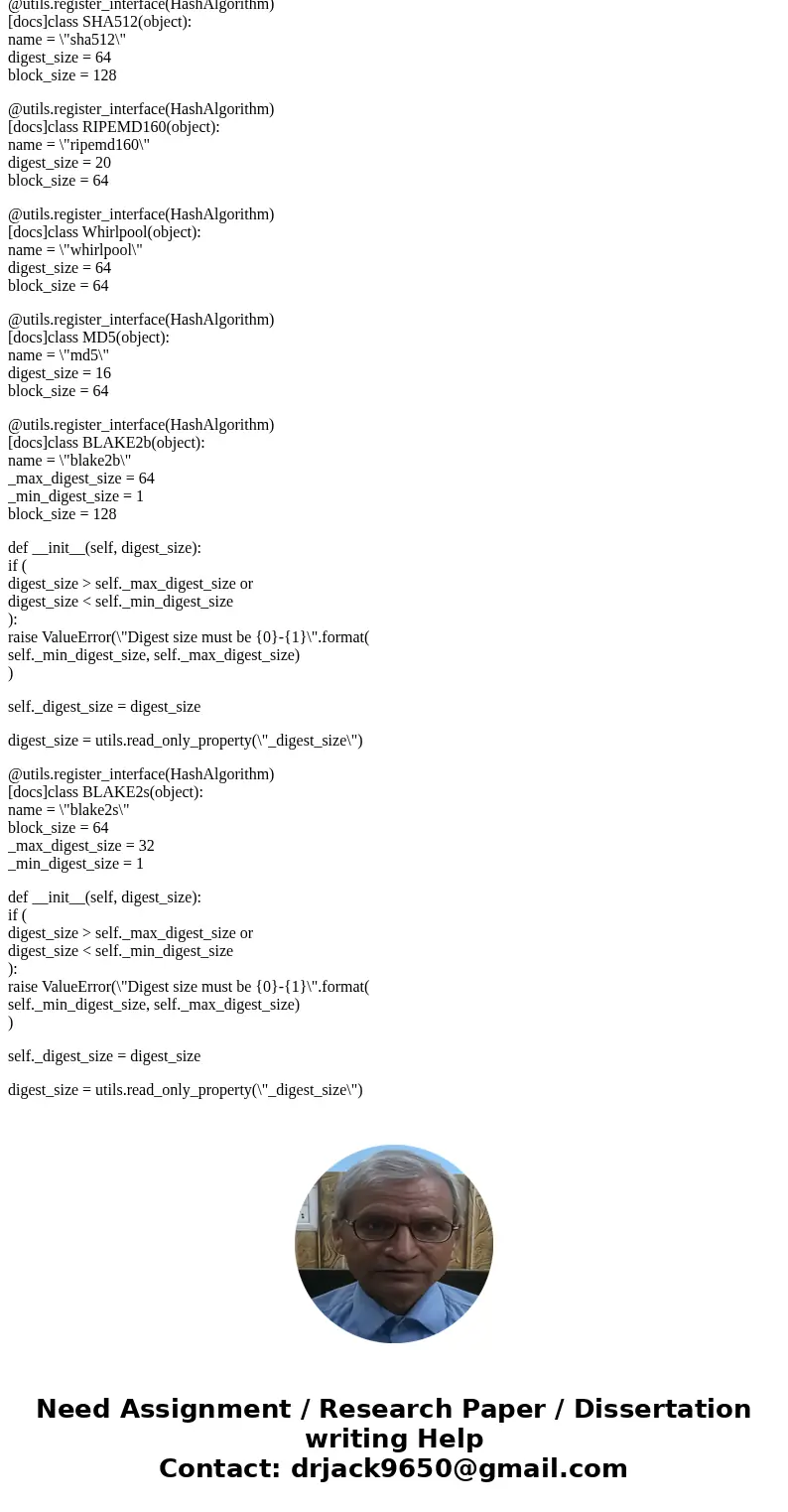Write a Python program that tries to find a collision by usi
Write a Python program that tries to find a collision by using SHA-256 as in the Python sample code below. Let your program generate ten hash values of random fraudulent messages (i.e., sets of three composite numbers) and report whether a collision was found.
Sample Code
from cryptography.hazmat.backends import default_backend
from cryptography.hazmat.primitives import hashes digest = hashes.Hash(hashes.SHA256(), backend=default_backend())
digest.update(b\"251\")
digest.update(b\"157\")
digest.update(b\"191\")
digest.finalize()
Solution
from __future__ import absolute_import, division, print_function
import abc
import six
from cryptography import utils
from cryptography.exceptions import (
AlreadyFinalized, UnsupportedAlgorithm, _Reasons
)
from cryptography.hazmat.backends.interfaces import HashBackend
@six.add_metaclass(abc.ABCMeta)
[docs]class HashAlgorithm(object):
@abc.abstractproperty
def name(self):
\"\"\"
A string naming this algorithm (e.g. \"sha256\", \"md5\").
\"\"\"
@abc.abstractproperty
def digest_size(self):
\"\"\"
The size of the resulting digest in bytes.
\"\"\"
@abc.abstractproperty
def block_size(self):
\"\"\"
The internal block size of the hash algorithm in bytes.
\"\"\"
@six.add_metaclass(abc.ABCMeta)
[docs]class HashContext(object):
@abc.abstractproperty
def algorithm(self):
\"\"\"
A HashAlgorithm that will be used by this context.
\"\"\"
@abc.abstractmethod
[docs] def update(self, data):
\"\"\"
Processes the provided bytes through the hash.
\"\"\"
@abc.abstractmethod
[docs] def finalize(self):
\"\"\"
Finalizes the hash context and returns the hash digest as bytes.
\"\"\"
@abc.abstractmethod
[docs] def copy(self):
\"\"\"
Return a HashContext that is a copy of the current context.
\"\"\"
@utils.register_interface(HashContext)
[docs]class Hash(object):
def __init__(self, algorithm, backend, ctx=None):
if not isinstance(backend, HashBackend):
raise UnsupportedAlgorithm(
\"Backend object does not implement HashBackend.\",
_Reasons.BACKEND_MISSING_INTERFACE
)
if not isinstance(algorithm, HashAlgorithm):
raise TypeError(\"Expected instance of hashes.HashAlgorithm.\")
self._algorithm = algorithm
self._backend = backend
if ctx is None:
self._ctx = self._backend.create_hash_ctx(self.algorithm)
else:
self._ctx = ctx
algorithm = utils.read_only_property(\"_algorithm\")
[docs] def update(self, data):
if self._ctx is None:
raise AlreadyFinalized(\"Context was already finalized.\")
if not isinstance(data, bytes):
raise TypeError(\"data must be bytes.\")
self._ctx.update(data)
[docs] def copy(self):
if self._ctx is None:
raise AlreadyFinalized(\"Context was already finalized.\")
return Hash(
self.algorithm, backend=self._backend, ctx=self._ctx.copy()
)
[docs] def finalize(self):
if self._ctx is None:
raise AlreadyFinalized(\"Context was already finalized.\")
digest = self._ctx.finalize()
self._ctx = None
return digest
@utils.register_interface(HashAlgorithm)
[docs]class SHA1(object):
name = \"sha1\"
digest_size = 20
block_size = 64
@utils.register_interface(HashAlgorithm)
[docs]class SHA224(object):
name = \"sha224\"
digest_size = 28
block_size = 64
@utils.register_interface(HashAlgorithm)
[docs]class SHA256(object):
name = \"sha256\"
digest_size = 32
block_size = 64
@utils.register_interface(HashAlgorithm)
[docs]class SHA384(object):
name = \"sha384\"
digest_size = 48
block_size = 128
@utils.register_interface(HashAlgorithm)
[docs]class SHA512(object):
name = \"sha512\"
digest_size = 64
block_size = 128
@utils.register_interface(HashAlgorithm)
[docs]class RIPEMD160(object):
name = \"ripemd160\"
digest_size = 20
block_size = 64
@utils.register_interface(HashAlgorithm)
[docs]class Whirlpool(object):
name = \"whirlpool\"
digest_size = 64
block_size = 64
@utils.register_interface(HashAlgorithm)
[docs]class MD5(object):
name = \"md5\"
digest_size = 16
block_size = 64
@utils.register_interface(HashAlgorithm)
[docs]class BLAKE2b(object):
name = \"blake2b\"
_max_digest_size = 64
_min_digest_size = 1
block_size = 128
def __init__(self, digest_size):
if (
digest_size > self._max_digest_size or
digest_size < self._min_digest_size
):
raise ValueError(\"Digest size must be {0}-{1}\".format(
self._min_digest_size, self._max_digest_size)
)
self._digest_size = digest_size
digest_size = utils.read_only_property(\"_digest_size\")
@utils.register_interface(HashAlgorithm)
[docs]class BLAKE2s(object):
name = \"blake2s\"
block_size = 64
_max_digest_size = 32
_min_digest_size = 1
def __init__(self, digest_size):
if (
digest_size > self._max_digest_size or
digest_size < self._min_digest_size
):
raise ValueError(\"Digest size must be {0}-{1}\".format(
self._min_digest_size, self._max_digest_size)
)
self._digest_size = digest_size
digest_size = utils.read_only_property(\"_digest_size\")




 Homework Sourse
Homework Sourse